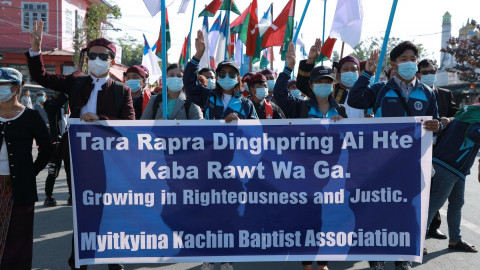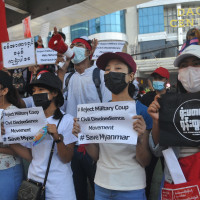လႈိဏ္ေခါင္းအဆုံးမွာ အလင္းေရာင္ကို ျမင္ရပါေတာ့မလား လဖိုင္ဆိုင္းေရာ္၏ ျမန္မာျပည္နိုင္ငံေရးသုံးသပ္ခ်က္
Topics
- Myanmar Commentary
- Ethnic Conflict in Myanmar
Regions
က်မတို႔ ျဖတ္သန္းေနရတဲ့ လႈိဏ္ေခါင္းဟာ အင္မတန္ ရွည္လ်ားလွတယ္၊ အႏွစ္ခုနစ္ဆယ္ေက်ာ္ ၾကာခဲ့ပါၿပီ။ ခုခ်ိန္ထိ လႈိဏ္ေခါင္းအဆုံးနားကို ေရာက္ေနၿပီလို႔ သိေစမဲ့ အလင္းေရာင္ဆိုတာ မျမင္ရေသး။ ဦးေဆာင္ေနသူေတြက ထြက္ေပါက္ကို အခိုင္အမာ ပိတ္ပစ္လိုက္ၾကၿပီ။ သာမန္ျပည္သူ ဘယ္သူမွ အျပင္မထြက္နိုင္ၾကေတာ့၊ လႈိဏ္ေခါင္းထဲမွာ ပိတ္မိေနသူေတြခမ်ာ အေပါက္ေသးေသးေလးေတြက ဝင္လာတဲ့ အလင္းတန္းေလးေတြကိုပဲ မၾကာမၾကာ ျမင္ခြင့္ရၾကေတာ့တယ္။ နိုင္ငံကို ဦးေဆာင္ေနသူေတြ သူတို႔ရဲ့ ကြဲျပားျခားနားမႈေတြကို ညွိနႈိင္းေျပလည္ခ်ိန္ဟာ အေမွာင္ကမၻာထဲ ဆယ္စုႏွစ္ေပါင္းမ်ားစြာမြန္းၾကပ္ေနၾကတဲ့ က်မတို႔ေတြအတြက္ သိပ္ေနာက္က်သြားနိုင္တယ္။

က်မတို႔ရဲ့ အနာဂတ္လွပဖို႔ လႈိဏ္ေခါင္းထဲက ဘယ္ပုံဘယ္နည္းနဲ႔ထြက္ရမလဲ ဆိုတဲ့ ေမးခြန္းကို ေမးရပါ ေတာ့မယ္။
ကိုဗစ္ ၁၉ ကာလအတြင္း က်မရဲ့မွတ္စုအေဟာင္းေတြကို ျပန္ၾကည့္ျဖစ္တယ္။ ၁၉၉၀ ေဖဖဝါရီလ ၂၄၊ ထိုင္းနိုင္ငံ၊ ကန္ဖန္ဖက္ျပည္နယ္ ေခါင္းစဥ္တပ္ထားတဲ့ မွတ္စုက ထူးျခားေနသလိုပဲ။ အဲဒီေန႔မွာ က်မဟာ ထင္ရွားတဲ့ ကခ်င္တိုင္းရင္းသားတစ္ေယာက္နဲ႔ ခရီးထြက္ေနခဲ့တယ္။ သူကေတာ့ ၁၉၈၀ ျပည့္ႏွစ္မ်ားထဲ အစၥေရးနိုင္ငံနဲ႔ ဖိလစ္ပိုင္နိုင္ငံေတြမွာ ျမန္မာသံအမတ္အျဖစ္ တာဝန္ထမ္းေဆာင္ခဲ့တဲ့ ဒူဝါလဝမ္ ျဖစ္ တယ္။ နိုင္ငံေတာ္ၿငိမ္ဝပ္ပိျပားမႈ တည္ေဆာက္ေရးအဖြဲ႕ (နဝတ)နဲ႔ ကခ်င္လြတ္ေျမာက္ေရးတပ္မေတာ္ ၁၉၉၄ ခုႏွစ္မွာ အပစ္အခတ္ရပ္စဲေရး ေဆြးေႏြးခ်ိန္က ေစ့စပ္ညွိနႈိင္းေပးသူ သုံးေယာက္ထဲက တစ္ေယာက္။ ကရင္ျပည္နယ္၊ မာနယ္ပေလာကို သြားၾကရင္း နအဖက ၁၉၉၀ ေမလမွာ က်င္းပေပးမဲ့ အေထြေထြေရြးေကာက္ပြဲအေၾကာင္း က်မတို႔ ေဆြးေႏြးျဖစ္ၾကတယ္။ ဒီေန႔ဒီအခ်ိန္မွာေတာ့ သူ႔စကားေတြက ေသြးထြက္ေအာင္မွန္တယ္လို႔ ေျပာရေတာ့မယ္ _
အမ်ိဳးသားဒီမိုကေရစီအဖြဲ႕ခ်ဳပ္က နိုင္ေလာက္တယ္၊ မဲအနည္းငယ္အသာစီးနဲ႔။ စစ္တပ္ကေတာ့ အနိုင္ရပါတီက သူတို႔နဲ႔ အာဏာခြဲေဝအုပ္ခ်ဳပ္မယ္ဆိုမွ အာဏာလႊဲေပးမွာပဲ။ အနိုင္ရပါတီရဲ့ အာဏာအေျခခံျဖစ္ေစမဲ့ ဖြဲ႕စည္းပုံအေျခခံဉပေဒမရွိေသးေတာ့ ေရြးေကာက္ပြဲအၿပီးျဖစ္လာမဲ့ အစိုးရဆိုတာကလည္း အေထြေထြညီလာခံ မေခၚနိုင္မခ်င္း ယာယီအစိုးရပဲ ျဖစ္ေနမွာ။
ေရြးေကာက္ပြဲေတြအၿပီး ဘာျဖစ္နိုင္တယ္ ဆိုတဲ့ လဝမ္ရဲ့ ေဟာကိန္းက ကြက္တိပဲ။ စစ္တပ္က အာဏာလႊဲမေပးခဲ့ဘူး၊ သူေျပာသြားတာေတြ ယေန႔အထိ မွန္ကန္ဆဲ။ ဒါေပမယ့္ သူအပါအဝင္ က်မတို႔ အမ်ားစုဟာ ၁၉၉၀ ေနာက္ပိုင္း ဆယ္စုႏွစ္မ်ားမွာ သာမန္ျပည္သူအမ်ားစုက ေဒၚေအာင္ဆန္းစုၾကည္နဲ႔ အမ်ိဳးသားဒီမိုကေရစီအဖြဲ႕ခ်ဳပ္ကို ေတာင္ၿပိဳကမ္းၿပိဳ ဆက္လက္အားေပးဝန္းရံၾကမယ္ဆိုတာ ေလၽွာ့တြက္ခဲ့ၾကတယ္။ အန္န္အယ္လ္ဒီဟာ ၁၉၉၀၊ ၂၀၁၂ (ၾကားျဖတ္ေရြးေကာက္ပြဲ)၊ ၂၀၁၅ နဲ႔ ၂၀၂၀ ေရြးေကာက္ပြဲတိုင္းမွာ ျပတ္ျပတ္သားသား ေအာင္ပြဲခံနိုင္ခဲ့တယ္။ ရွည္လ်ားလွတဲ့ အဲဒီႏွစ္မ်ားအတြင္းမွာ လူတိုင္းလက္ခံထားတဲ့ ပန္းတိုင္တစ္ခုေတာ့ ရွိခဲ့တယ္၊ အဲဒါကေတာ့ လူမ်ိဳးစုတိုင္း၊ နိုင္ငံေရးပါတီတိုင္း လက္ခံတဲ့ အေျခခံဥပေဒတစ္ခု လိုအပ္တယ္ဆိုတာပဲ။ အဲဒီပန္းတိုင္ကို ဘယ္လိုေရာက္ေအာင္သြားရမယ္ဆိုတာ အခရာက်တဲ့ ေမးခြန္း ျဖစ္တယ္။
သြားေလသူ ေကအိုင္အို ဥကၠဌ မရန္ဘရန္ဆိုင္းဆိုရင္ နဝတရဲ့ အေျခခံဥပေဒျဖစ္ေျမာက္ေရး လုပ္ငန္းစဥ္ကို ပုံေအာၿပီး ယုံၾကည္ခဲ့သူေတြထဲက တစ္ေယာက္ျဖစ္တယ္။ ၁၉၉၀ ႏွစ္မ်ားအစပိုင္းေလာက္မွာ နဝတက အဆိုျပဳတဲ့ (တိုင္းရင္းသား လက္နက္ကိုင္အဖြဲ႕ေတြ လက္နက္ဆက္လက္ဆြဲကိုင္နိုင္တယ္ ဆိုတာပါတဲ့) အပစ္အခတ္ရပ္ဆဲေရး ကမ္းလွမ္းမႈက အဲဒီအေျခအေနအရေတာ့ လက္ခံနိုင္စရာပဲ၊ သိပ္အဆင္ေျပေစမဲ့ လိုက္ေလ်ာမႈတစ္ခုလို႔ ျမင္ခဲ့ၾကတယ္။ ဥကၠဌႀကီးဘရန္ဆိုင္းရဲ့ ဦးေဆာင္မႈေအာက္မွာ ေမၽွာ္လင့္ခ်က္တဖက္၊ သတိႀကီးစြာထားရမႈတဖက္နဲ႔ ေကအိုင္အိုဟာ ၁၉၉၄ ေဖေဖာ္ဝါရီလမွာ နဝတနဲ႔ အပစ္အခတ္ရပ္ဆဲဖို႔ သေဘာတူညီခဲ့တယ္။ နစ္နာခဲ့ရတာေတြကို ေျပလည္ေစဖို႔ ကတိေပးထားတဲ့ အေျခခံဥပေဒမူၾကမ္းကို ေရးဆြဲမဲ့ အေထြေထြညီလာခံႀကီးမွာ ျပည္ေထာင္စုႀကီးကို အတူတူ တည္ေဆာက္ေနၾကသူေတြနဲ႔အတူ ပါဝင္ခြင့္ရတာဟာ သူ႔အတြက္ေတာ့ ဘုရားေပးတဲ့ အခြင့္အေရးလို႔ သူ ျမင္ခဲ့တယ္။ ဗမာ၊ ကခ်င္၊ ကရင္၊ ကယား၊ ခ်င္း၊ မြန္၊ ရွမ္းနဲ႔ရခိုင္ - အဲဒီတိုင္းရင္းသားေပါင္းစုံက တိုင္းျပည္ရဲ့ အနာဂါတ္အတြက္ အေျဖတစ္ခုကို ဝိုင္းဝန္းရွာနိုင္ၾကၿပီလို႔ သူေတြးခဲ့တယ္။
ကံဆိုးတာကေတာ့ အဲဒီေနာက္ပိုင္းသမိုင္းျဖစ္ရပ္ေတြက သင္ယူခဲ့ၾကရတဲ့အတိုင္း နဝတ (ေနာင္တြင္ နအဖ ဟုအမည္ေျပာင္း) လက္ေအာက္မွာ က်င္းပတဲ့ အေထြေထြညီလာခံေၾကာင့္ အျငင္းပြားေစတဲ့၊ သေဘာထားကြဲလြဲမႈျဖစ္ေစတဲ့ နိုင္ငံေရးစနစ္တစ္ခုကိုသာ ရရွိခဲ့ပါတယ္၊ အဲဒီညီလာခံဟာ စကတည္းက ယဥ္သကို ျဖစ္႐ုံမက၊ ညီလာခံရလာဒ္ေတြကို အေကာင္အထည္ေဖာ္ရာမွာလည္း ညံ့ဖ်င္းခဲ့ပါတယ္။ ၿငိမ္းခ်မ္းေရးနဲ႔ ဒီမိုကေရစီဆိုတာ က်မတို႔နိုင္ငံနဲ႔ေဝးပါေသးတယ္၊ ၂၀၀၈ အေျခခံဥပေဒကို ျပင္လို႔မရေအာင္ သုံးေခ်ာင္းလုံးရွိမွ အလုပ္ျဖစ္မဲ့ ဆက္စပ္မႈရွိတဲ့ ေသာ့သုံးေခ်ာင္းနဲ႔ ခတ္ထားတယ္။ ပထမေသာ့က ဥပေဒျပဳလႊတ္ေတာ္တိုင္းမွာ တပ္မေတာ္သား ကိုယ္စားလွယ္ ၂၅ရာႏႈန္းရွိရမယ္ဆိုတာပါ။ ဒုတိယက အေျခခံဥပေဒကို ျပင္ခ်င္ရင္ လႊတ္ေတာ္ႏွစ္ရပ္လုံးက ၇၅ရာႏႈန္းေက်ာ္မဲေပးမွ ရမယ္တဲ့။ တတိယအခ်က္ကေတာ့ ဝန္ႀကီးဌာနသုံးခုကို ထိမ္းခ်ဳပ္ထားတဲ့အျပင္ တပ္မေတာ္ေခါင္းေဆာင္ေတြဟာ ၂၀၀၈ အေျခခံဥပေဒကို ကာကြယ္မယ္၊ ေစာင့္ေရွာက္မယ္လို႔ အခိုင္အမာ ေျပာဆိုေနတာေတြ ျဖစ္တယ္။
အဲဒီလိုအေျခအေနေၾကာင့္ နိုင္ငံေရးဒြိဟ ရွိေနပါတယ္။ ၂၀၀၈ ဖြဲ႕စည္းပုံအေျခခံဥပေဒ အၾကပ္အတည္းကို ေျဖရွင္းဖို႔ တစ္ခုတည္းေသာ နည္းလမ္းက စစ္တပ္အမတ္ေတြ ပါဝင္မဲေပးေစဖို႔ ျဖစ္တယ္။ စစ္တပ္က မဲေပးပါ့မလား။ တကယ္လို႔ သူတို႔ေျပာတဲ့အတိုင္း ၂၀၀၈ ဖြဲ႕စည္းပုံနဲ႔ပဲ ၂၀၂၂မွာ ေရြးေကာက္ပြဲျပန္က်င္းပေပးရင္ ဘာျဖစ္နိုင္လဲ။ အဲဒီလို လုပ္မယ္ဆိုရင္ေတာ့ စစ္ေခါင္းေဆာင္ေတြဟာ အရပ္သားအစိုးရရဲ့ အစိတ္အပိုင္းေတာ္ေတာ္မ်ားမ်ားကို သူတို႔ ထိန္းခ်ဳပ္လို႔မရရင္ အာဏာလႊဲေပးမွာမဟုတ္ဘူးဆိုတာ လူထုကို ရွင္းရွင္းေျပာလိုက္သလို ျဖစ္ေနမယ္။ အႏွစ္ခ်ဳပ္ကေတာ့ လက္ရွိနိုင္ငံေရးအခင္းအက်င္းအတိုင္းဆို ဘာမွေျပာင္းလဲမွာမဟုတ္။ ဒီလိုနဲ႔ပဲ နိုင္ငံေရးအၾကပ္အတည္းဟာ က်မတို႔နိုင္ငံမွာ အင္မတန္နက္ရွိုင္းလာပါတယ္။
ေဖေဖာ္ဝါရီ ၁ ရက္ေန႔ မနက္လင္းအားႀကီးအခ်ိန္ စစ္တပ္က အာဏာသိမ္းတယ္လို႔ ေၾကျငာေတာ့ က်မရဲ့ မူလအေတြးက အမ်ားနဲ႔ မတူခဲ့ပါဘူး။ ၂၀၀၈ အေျခခံဥပေဒကို ရပ္နားလိုက္ၿပီး အေထြေထြညီလာခံ က်င္းပရင္ ဘယ္လိုလုပ္မလဲ။ အဲဒီလိုဆိုရင္ေတာ့ လႈိဏ္ေခါင္အဆုံးမွာ အလင္းေရာင္ေတြ႕ရေကာင္း ေတြ႕ရနိုင္တယ္။ တရားမၽွတမႈမရွိတဲ့စနစ္တစ္ခုနဲ႔ သမမၽွတမႈမရွိတဲ့ကိုယ္စားလွယ္စနစ္ကို တျဖည္းျဖည္း အသြင္းေျပာင္းယူဖို႔ မျဖစ္နိုင္ဘူးလို႔ လြန္ခဲ့တဲ့ အႏွစ္သုံးဆယ္က အေတြ႕အၾကဳံမ်ားအရ က်မတို႔ သိလာၾကတယ္။ နိုင္ငံေရးဒိုင္ယာေလာ့ေတြ၊ ၿငိမ္းခ်မ္းေရးနဲ႔အမ်ိဳးသားရင္ၾကားေစ့ေရး လုပ္ငန္းစဥ္အားလုံးမွာ ျပည္သူလူထုအားလုံးပါဝင္မွ ၂၀၂၁ခုႏွစ္မွာ နိုင္ငံေတာ္က်ရႈံးျခင္းသံသရာကလြန္ေျမာက္မွာ ျဖစ္တယ္။
လြန္ခဲ့တဲ့ရက္သတၱႏွစ္ပတ္အတြင္း နိုင္ငံေရးျပႆနာဟာ ပိုမိုနက္ရွိုင္းလာၿပီး ဘဝရပ္တည္ေရးနဲ႔လုံျခဳံေရးကို ၿခိမ္းေျခာက္မႈေတြဟာ နိုင္ငံအႏွံ့ကို ျပန႔္ႏွံ့သြားခဲ့တယ္။ ဒီလိုအေျခအေနမ်ိဳးဟာ တိုင္းရင္းသားလူမ်ိဳးစုေတြအတြက္ေတာ့ အျမဲတမ္း ရင္ဆိုင္ခဲ့ရတဲ့ အရွိတရားပါ။ စစ္တပ္က အာဏာသိမ္းၿပီး နိုင္ငံေရး လုပ္ငန္းစဥ္ေတြ ပ်က္ျပားခဲ့တာမ်ိဳး အရင္ကလည္း က်မတို႔ ၾကဳံခဲ့ဖူးပါတယ္။ ဒီအခ်ိန္ဟာ ေသြးပ်က္ေနရမဲ့အခ်ိန္ေတာ့ မဟုတ္ပါဘူး။ တျခားအခ်ိန္ေတြထက္ကို လတ္ဆတ္တဲ့အေတြးအေခၚေတြ လိုအပ္တဲ့ အခ်ိန္၊ လ်စ္လ်ဴရႈထားခဲ့ၾကတဲ့ ေျဖရွင္းနိုင္တဲ့ တျခားနည္းေတြလည္း ရွိေသးတာ သိဖို႔လိုပါတယ္။ ေဖဖဝါရီလ အတြင္း အျဖစ္အပ်က္ေတြေၾကာင့္ ျမန္မာနိုင္ငံမွာ အေျခခံကစၿပီး ေျပာင္းလဲဖို႔လိုတယ္ ဆိုတာ တကမၻာလုံးကို ခ်ျပသလို ျဖစ္သြားပါတယ္။
စိန္ေခၚမႈေတြနဲ႔အတူ ႀကီးမားတဲ့ တာဝန္ယူမႈေတြလည္း ပါလာၾကပါတယ္။ လက္ရွိျဖစ္ေနတဲ့ နိုင္ငံေရး အခက္အခဲက အမွန္တကယ္ လြတ္ေျမာက္ခ်င္ရင္ ေကာင္းသည္ျဖစ္ေစ၊ ဆိုးသည္ျဖစ္ေစ အတိတ္က သင္ခန္းစာေတြကို သင္ယူၾကရပါမယ္။ အဲဒီလိုမဟုတ္ရင္ေတာ့ ဘယ္နိုင္ငံေရးစနစ္ပဲလာလာ အဓိကအာဏာရွင္ေတြ ေျပာင္းလဲမသြားဘူးလို႔ က်မတို႔ ယူဆခဲ့တဲ့ ၁၉၈၈ မတိုင္ခင္ေခတ္ကို ျပန္ဆြဲေနၿပီလို႔ တိုင္းရင္းသားလူမ်ိဳးစုေတြက ယုံၾကည္သြားၾကပါလိမ့္မယ္။ ၁၉၈၈ တုန္းကေတာ့ ၿမိဳ႕ႀကီးေတြမွာ ဗမာလူမ်ိဳးအမ်ားစုက ဆႏၵျပေနခ်ိန္မွာ တိုင္းရင္းသားလက္နက္ကိုင္အဖြဲ႕ေတြက ၾကည့္ရႈသူပရိတ္သတ္ပဲ လုပ္ခဲ့ၾကတယ္။ ၁၉၉၀ ေရြးေကာက္ပြဲအၿပီး တိုင္းရင္းသားလက္နက္ကိုင္ေဒသေတြကို ခိုလႈံလာၾကတဲ့ ဒီမိုကေရစီတိုက္ပြဲဝင္ေက်ာင္းသားေတြနဲ႔ လႊတ္ေတာ္အမတ္မ်ားေၾကာင့္သာ တိုင္းရင္းသားလူမ်ိဳးစုေတြနဲ႔ ဒီမိုကေရစီအင္အားစုအၾကား ခိုင္ျမဲတဲ့လက္တြဲမႈနဲ႔ ညီညြတ္ေရးကို တည္ေဆာက္နိုင္ခဲ့ၾကတယ္။ က်မတို႔အားလုံးရဲ့ ဘုံတိုက္ပြဲဟာ လြတ္လပ္ခြင့္အတြက္ဆိုတာကို သေဘာေပါက္လာၾကၿပီး စစ္မွန္တဲ့ဖယ္ဒရယ္ျပည္ေထာင္စုႀကီး ေပၚေပါက္လာေအာင္ ဝိုင္းဝန္းႀကိဳးစားၾကမယ္လို႔ အတူတကြ ကတိျပဳခဲ့ၾကတယ္။
အဲဒီညီညြတ္ေရးဟာ ၂၀၁၂ ၾကားျဖတ္ေရြးေကာက္ပြဲ အလြန္ကာလမ်ားမွာ လုံးပါးပါးလာခဲ့တယ္။ အဲဒီအေျခအေနေၾကာင့္ က်မတို႔နိုင္ငံဟာ “စစ္တပ္နိုင္ငံ” ဒါမွမဟုတ္ “အဖအေမြနိုင္ငံ” ဒါမွမဟုတ္ အဲဒီႏွစ္ခုကိုေပါင္းထားတဲ့နိုင္ငံ အျမဲျဖစ္ေနမွာလားဆိုတဲ့ က်မတို႔ရဲ့သံသယကို ပိုမိုႀကီးထြားေစခဲ့တယ္။ ဗမာလူမ်ိဳးအမ်ားစုရဲ့နိုင္ငံေရးျပႆနာဟာ တိုင္းျပည္တျပည္လုံးရဲ့ မတည္ၿငိမ္မႈနဲ႔ ဆက္စပ္ေနတယ္ဆိုတာကို သူတို႔သေဘာမေပါက္မွာ က်မတို႔ စိုးရိမ္တယ္။ အလယ္က ဗမာနိုင္ငံေရး မတည္ၿငိမ္သေရြ႕ တတိုင္းျပည္လုံးလည္း တည္ၿငိမ္မွာမဟုတ္။ ဘယ္သူနဲ႔လက္တြဲရမယ္၊ ဘယ္သူ႔ဖက္က လိုက္ရမယ္ဆိုတာေတြဟာ ဒီလို နိုင္ငံေရးအခက္အခဲေတြႀကဳံတိုင္း က်မတို႔ တိုင္းရင္းသားေတြ မိမိကိုယ္ကို ေမးခဲ့ရတဲ့ ေမးခြန္းေတြ ျဖစ္တယ္။
ဒီေန႔ဒီအခ်ိန္မွာ လူႀကီးအမ်ားစုက ဇက္မ်ိဳးဆက္အေပၚ ေမၽွာ္လင့္ခ်က္ထားေနၾကပါတယ္။ လူငယ္ေတြ နားလည္ထားရမွာက က်မတို႔ရဲ့ လြတ္လပ္ခြင့္တိုက္ပြဲမွာ ႀကီးမားတဲ့ကြာဟခ်က္ေတြ ရွိတယ္ဆိုတာပါ။ “နယ္စပ္ေဒသ” “ေတာင္ေပၚလူမ်ိဳးစု” က်မတို႔ တိုင္းရင္းသားေတြရဲ့ တိုက္ပြဲက ကိုယ္ပိုင္အုပ္ခ်ဳပ္ခြင့္ ရရွိေရးနဲ႔ မိမိနယ္ေျမကို မိမိဦးစီးနိုင္တဲ့ အုပ္ခ်ဳပ္မႈရွိေရး ျဖစ္တယ္။ အဲဒီကတိကဝတ္ေတြေၾကာင့္ ၁၉၄၇ ေဖေဖာ္ဝါရီ ပင္လုံညီလာခံမွာ ျပည္ေထာင္စုႀကီးတခုလုံးအေနနဲ႔ လြတ္လပ္ေရးယူမယ္လို႔ က်မတို႔ တိုင္းရင္းသားေခါင္းေဆာင္ေတြ သေဘာတူခဲ့ၾကတယ္။ ေရြးေကာက္ပြဲသက္သက္နဲ႔ေတာ့ က်မတို႔ လိုခ်င္တာေတြရမွာ မဟုတ္ပါ။ တနိုင္ငံလုံးက တိုင္းရင္းသားအားလုံးရဲ့ အခြင့္အေရးကို အာမခံမဲ့ နိုင္ငံေရးစနစ္မ်ိဳးကို က်မတို႔ လိုလားပါတယ္။
တိုင္းရင္းသားေဒသမ်ားက နိုင္ငံသားေတြက သူတို႔အျမဲတမ္း လုပ္ခဲ့တာကို ဆက္လုပ္ဖို႔ လိုပါလိမ့္မယ္။ တိုင္းရင္းသား လူမ်ိဳးစု အခ်င္းခ်င္းသာမက ဘာသာစကားေတြ၊ မိသားစုဝင္ေတြ ဆက္စပ္ေနတဲ့ အိမ္နီးခ်င္းနိုင္ငံက ျပည္သူေတြနဲ႔ပါ အဆင္ေျပေအာင္ ေနၾကရပါမယ္။ ဒီလိုတန္ဖိုးေတြကို ရွင္သန္ေအာင္ လက္ဆက္ထိန္းသိမ္းဖို႔ လိုပါတယ္။ အဲဒီလိုမွမဟုတ္ရင္ေတာ့ က်မတို႔ေတြ ေမွာင္မဲေနတဲ့ လႈိဏ္ခါင္းထဲ ထာဝရပိတ္မိသြားနိုင္တယ္။
လႈိဏ္ေခါင္းထဲက လူတခ်ိဳ႕ ထြက္လာနိုင္တယ္ဆိုပါစို႔။ က်မတို႔ရဲ့ အဓိကလိုအပ္ခ်က္ကို သူတို႔ နားမလည္ရင္ သူတို႔ျမင္ရတဲ့ အလင္းေရာင္ကလည္း ခဏပဲခံမွာပါ။ က်မတို႔ နိုင္ငံဟာ တိုင္းရင္းသားေပါင္းစုံ၊ ကိုးကြယ္ရာေပါင္းစုံနဲ႔ ဖြဲ႕စည္းထားတဲ့ မွန္စီပန္းခ်ီကားတစ္ခ်ပ္ ျဖစ္တယ္။ အဲဒီပန္းခ်ီကားရဲ့ မွန္ကူကြက္ေလးေတြ တခုခ်င္းစီ တူညီတဲ့လြတ္လပ္ခြင့္နဲ႔ လူ႔အခြင့္အေရးကို ခံစားရမွသာ က်မတို႔အားလုံး ၿငိမ္းခ်မ္းမႈ၊ ခ်မ္းသာသုခ၊ တည္ၿငိမ္မႈေတြနဲ႔အတူ ျဖတ္သန္း နိုင္ပါလိမ့္မယ္။ ဒီေန႔ဒီအခ်ိန္ဟာ မတူကြဲျပားမႈကို အားနည္းခ်က္လို႔ မျမင္ဘဲ အားသာခ်က္လို႔ ျမင္ၿပီး က်မတို႔အားလုံးအတြက္ ပိုမိုေကာင္းမြန္တဲ့၊ ေမၽွာ္လင့္ခ်က္ျပည့္ဝတဲ့ အနာဂတ္အသစ္ကို ပုံေဖာ္ဖို႔အခ်ိန္ေကာင္းပဲ ျဖစ္ပါတယ္။
လဖိုင္ဆိုင္းေရာ္သည္ ၂၀၁၃ ခုႏွစ္ ေရမြန္မက္ေဆးေဆးဆုရွင္ ျဖစ္ၿပီး ေမတၱာဖြံ႔ၿဖိဳးေရးေဖာင္ေဒးရွင္းႏွင့္ ဧရာဝတီေဖာင္ေဒးရွင္းတို႔ကို ထူေထာင္သူ ျဖစ္သည္။ သူမသည္ ၂၁ ရာစု ပင္လုံညီလာခံကို တက္ေရာက္သူ ကိုယ္စားလွယ္တစ္ဦးလည္း ျဖစ္သည္။

